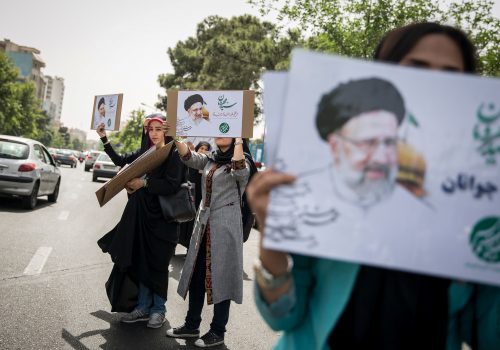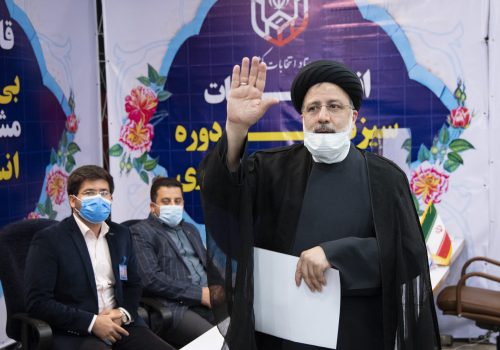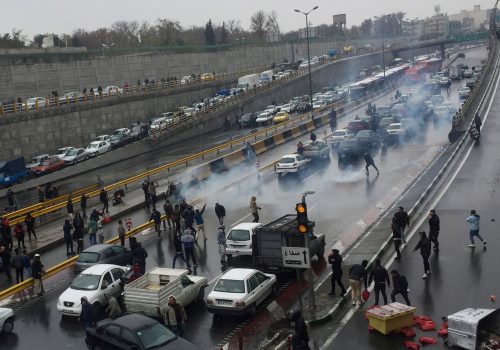A Raisi presidential win may be his undoing as future Supreme Leader
The Guardian Council, which vets all candidates for elected office in Iran, has done everything possible to ensure that Judiciary Chief and hardliner Ebrahim Raisi is elected president on June 18 by disqualifying all those who presented any semblance of competition to him. Conventional wisdom is that the election will facilitate Raisi’s ascent to the real decision-making post in Iran—that of Supreme Leader—when its 82-year-old incumbent passes from the scene.
But nothing is ever certain in Iran’s contentious politics. In the thirty-two years since Ayatollah Ali Khamenei has led the country, many would-be successors have fallen one way or another.
Former Judiciary Chief Ayatollah Mahmoud Hashemi Shahroudi died of a brain tumor in 2018. Former President Akbar Hashemi Rafsanjani died a year earlier while swimming—circumstances that even regime loyalists considered suspicious. A third contender, Expediency Council chairman and former judiciary chief Ayatollah Sadeq Larijani, faces allegations of corruption. Larijani, who is also a veteran member of the Guardian Council, has confirmed that security forces directly intervened in the presidential process to eliminate Raisi competitors, such as Larijani’s brother, former parliamentary speaker Ali Larijani.
The disqualification of Larijani had a dual function: not just removing a pragmatist who was considered Raisi’s main rival, but ensuring that his brother Sadeq would lose influence over the battle to succeed Khamenei. Besides Raisi, the only remaining leadership hopeful with a significant chance is Khamenei’s powerful second son, Mojtaba.
Three years ago, it would have been unrealistic to consider Raisi as a candidate for the leadership post, but today he is openly mentioned as a man with “higher” ambitions. For his ambitions to be realized, it would be useful to attain a high percentage of votes in the upcoming presidential elections.
What has been overlooked in some recent analyses is the rise of Mojtaba Khamenei, whose role in political developments surfaced after the 2009 presidential elections. He is believed to have helped direct the fraudulent vote count and suppression of dissent—known as the Green Movement—that followed. The younger Khamenei has been gradually consolidating influence in the Islamic Revolutionary Guard Corps (IRGC) and other security forces and institutions under the direct command of his father.
There have been recent reports in unofficial media that Mojtaba’s authorities in his father’s office have increased and that he has been delegated more managerial and decision-making tasks. If these reports are correct, Mojtaba may plan to use security forces, especially the IRGC, to ensure that he replaces his father and, in effect, turns Iran’s “Islamic Republic” into another of the Middle East’s many hereditary authoritarian systems.
However, Mojtaba needs to undermine Raisi to consolidate control and what better way to do this than to discredit him. The vetting process, which seems to guarantee an easy victory for Raisi, may actually damage Raisi’s reputation, especially if turnout is low and he fails to amass the fifteen million votes he got in 2017, when he lost to incumbent Hassan Rouhani. There is no pride in winning an election with no real competitors and a shamefully low turnout. Just ask Syria’s Bashar al-Assad, who recently “won” a fourth term, purportedly with 95.1 percent of the vote. Raisi would become a target of public humiliation and it could seriously damage his chances to achieve his bigger ambition.
There were two sets of negative reactions to the Guardian Council’s vetting decisions. The reformist and moderate camp, including Rouhani himself, warned that the Islamic Republic, the institution of elections, and people’s free choice had been weakened.
A second group has been more direct, pointing to “the banana skin under Raisi’s feet.” Among them is Hassan Khomeini, a grandchild of Ayatollah Ruhollah Khomeini, the leader of the 1979 revolution, who explicitly advised Raisi to “withdraw from the race” or “the legitimacy of the Islamic Republic is at risk.”
Even the former editor of the hardline Kayhan newspaper Mehdi Nasiri warned that the extreme vetting process by the Guardian Council was “a scenario designed to discredit Raisi.” Nasiri implied that the embarrassment of winning an uncontested election would disqualify Raisi from future posts and produce a weak presidential administration in the short term.
The most pointed response to the Council’s decision came from political dissident Mostafa Tajzadeh, who warned that the election arrangement is intended “to make the leadership hereditary. This will be even worse than an election coup. Reviving the monarchy will have catastrophic consequences.”
The June election is being held in perhaps the most volatile social and political situation in Iran in the past forty-two years. The gap between the people and their rulers has widened to such a critical level—due to the poor economic situation and stifling repression—that some even suggest that this may be the last presidential election under the current political system. Even regime insider President Rouhani has warned that “it is because of the people the regime has been preserved so far. We should not forget that the objective of the election is to preserve the regime.”
Former President Mohammad Khatami, a reformist who still has a following in Iran but whose face is banned in the media due to his backing of the 2009 Green Movement, noted on May 27 that “the anti-democracy trend is becoming bolder.” In the words of a prominent social media activist: “this is not the ideal for which we fought and for which many sacrificed their lives.”
The impact of the extreme vetting has also been clear in the steady decline in the percentage of Iranians who say they will bother to vote. Opinion polls conducted by the Iranian Students Polling Agency show a sharp drop from 43 percent on May 20 to 36 percent on May 27, two days after the Guardian Council announced the names of seven approved candidates.
While Western analysts have focused on the moderate-hardliner battles to explain developments like the slow-moving negotiations to restore the Iran nuclear deal, a successful election boycott would change the main line of confrontation in Iran to the people versus the regime.
The author, who is well versed in the Iranian political scene, asked to remain anonymous.
Image: Ebrahim Raisi, head of Iran's judiciary, gives a speech during a ceremony to mark the one year anniversary of the killing of senior Iranian military commander General Qassem Soleimani in a U.S. attack, in Tehran, Iran January 1, 2021. Majid Asgaripour/WANA (West Asia News Agency) via REUTERS


